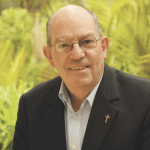WelCom September 2018:
Fr James Lyons

Fr James Lyons.
Announcing the Year of Mercy, Pope Francis wrote that Mercy will always be greater than any sin, and no one can place limits on the love of God who is always ready to forgive. [Misericordiae Vultus. 2013, par3]. It is in the context of this ‘Year’, which began with the opening of ‘Doors of Mercy’ in churches throughout the world, that the Pope reminded us the Name of God is Mercy – surely one of the most consoling and encouraging aspects of Christian belief.
To know that the God revealed in Jesus Christ, the God we worship as Creator and Giver of life, is a God whose essence is mercy, who loves life more than anything else, must be shared and proclaimed for all the world to hear. It is this assurance that forgiveness is possible, that bad choices can be transfigured, is what so many yearn to know.
Chapter 15 of Luke’s gospel comprises three of Jesus’ parables. Each is powerful, but together they are truly significant. We first read of the lost sheep, then the lost coin, followed by the lost son. The shepherd, the woman and the parent agonise over their loss and there is the greatest rejoicing in all three households when the lost is found. To me, the sheep represents the animal world, the coin represents the material world and the son is there for all humanity. God wants nothing to be lost. All creation is sacred. Love never ends.
Nothing should keep any of us from admitting our failures and accepting God’s mercy. There is no need to fear. God is in fact looking out for us, searching and waiting, with a welcome home feast in mind. But – yes, there is a ‘but’ – the chapter ends with the older brother unable to forgive, suggesting he knows God by a different name! What is your name for God?